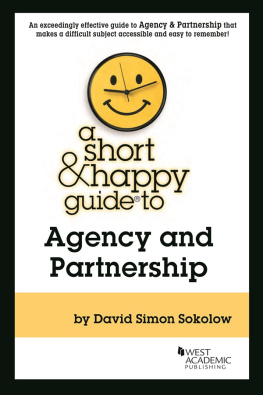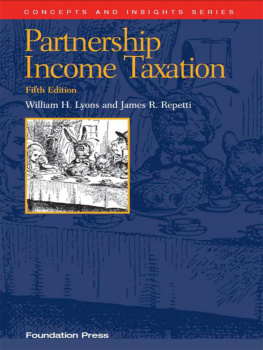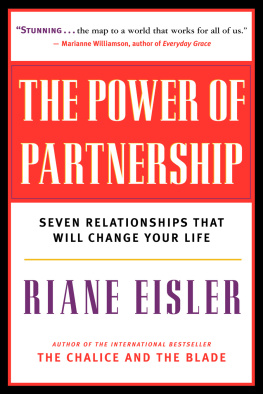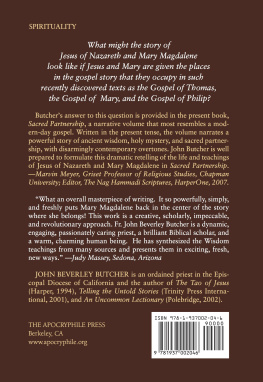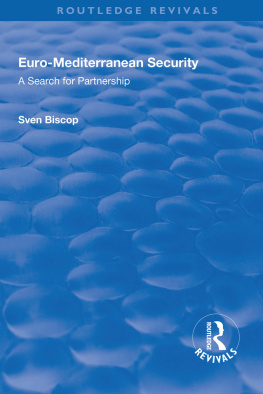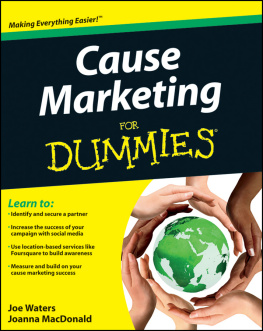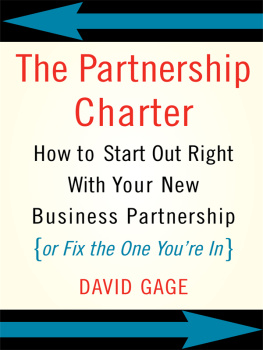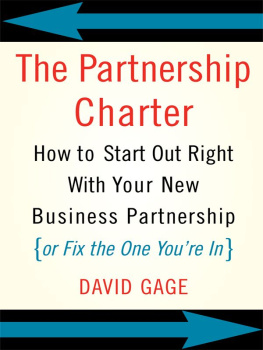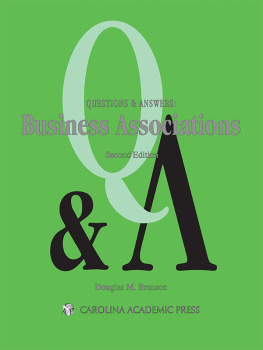West Academic Publishings Emeritus Advisory Board
Jesse H. Choper
Professor of Law and Dean Emeritus
University of California, Berkeley
Yale Kamisar
Professor of Law Emeritus, University of San Diego
Professor of Law Emeritus, University of Michigan
Mary Kay Kane
Professor of Law, Chancellor and Dean Emeritus
University of California, Hastings College of the Law
Larry D. Kramer
President, William and Flora Hewlett Foundation
James J. White
Robert A. Sullivan Emeritus Professor of Law
University of Michigan
West Academic Publishings Law School Advisory Board
Joshua Dressler
Distinguished University Professor Emeritus
Michael E. Moritz College of Law, The Ohio State University
Meredith J. Duncan
Professor of Law
University of Houston Law Center
Rene McDonald Hutchins
Dean and Joseph L. Rauh, Jr. Chair of Public Interest Law
University of the District of Columbia David A. Clarke School of Law
Renee Knake Jefferson
Joanne and Larry Doherty Chair in Legal Ethics &
Professor of Law, University of Houston Law Center
Orin S. Kerr
Professor of Law
University of California, Berkeley
Jonathan R. Macey
Professor of Law,
Yale Law School
Deborah Jones Merritt
Distinguished University Professor,
John Deaver Drinko/Baker & Hostetler Chair in Law
Michael E. Moritz College of Law, The Ohio State University
Arthur R. Miller
University Professor, New York University
Formerly Bruce Bromley Professor of Law, Harvard University
Grant S. Nelson
Professor of Law Emeritus, Pepperdine University
Professor of Law Emeritus, University of California, Los Angeles
A. Benjamin Spencer
Dean & Chancellor Professor of Law
William & Mary Law School

Agency and Partnership
David Simon Sokolow
The University of Texas School of Law
A SHORT & HAPPY GUIDE SERIES

The publisher is not engaged in rendering legal or other professional advice, and this publication is not a substitute for the advice of an attorney. If you require legal or other expert advice, you should seek the services of a competent attorney or other professional.
a short & happy guide series is a trademark registered in the U.S. Patent and Trademark Office.
2021 LEG, Inc. d/b/a West Academic
444 Cedar Street, Suite 700
St. Paul, MN 55101
1-877-888-1330
Printed in the United States of America
ISBN: 978-1-62810-148-5
To my wife, Tobi, my partner in every sense of the word
Acknowledgments
First and foremost, I would like to thank the thousands of students in my Business Associations class at The University of Texas School of Law over the last 40 years, especially those with little or no business background. Their I have no clue what you are talking about quandary forced me to find creative ways to explain complicated business statutes and the impact of those statutes out in the real world. You made me a better teacher.
I would particularly like to thank Bonnie Devany, UT 22, and Benjamin Ediger, UT 22, for their editorial assistance and substantive suggestions for improvement. They were instrumental in making the book more accessible to its target audience.
I would also like to thank my team at West: Louis Higgins, who signed me up to write the book (alas, no signing bonus) and Megan Putler, Megan Hoffman, and Greg Olson, the editors and production manager who brought the book to life.
Finally, I would like to acknowledge my assistant, Nancy Bennett, who consistently keeps me honest; my wife, Tobi, whose astute observations improved the book enormously; and my son, Adam, for his loving support and wicked sense of humor.
About the Author
David Simon Sokolow has taught Business Associations and Contracts at The University of Texas School of Law for forty years. A five-time winner of the Teacher-of-the-Year award, he has lectured for BARBRI for more than three decades on A&P, Contracts, and Corporations. From 20032013, he was U.T.s Director of Student Life, creating and implementing programs to foster community and reduce stress at the law school. He earned his B.A., M.A. (art history), and J.D. at Columbia. Before coming to U.T., he clerked for The Honorable Thomas Gibbs Gee of the Fifth Circuit and practiced Entertainment Law at Paul, Weiss, Rifkind, Wharton & Garrison in New York. After teaching B.A. for a while, he realized he could benefit from having more business background, so he went to school on weekends to earn an M.B.A. at U.T. He has been a visiting professor at Emory, Ohio State, S.M.U. and Case Western Reserve, and taught Art Law abroad for the University of San Diego and St. Marys. He loves his wife, his son and teaching, not necessarily in that order!
Introduction
I usually have more than 100 students in my B.A. class. They fall into two categories: (1) students with business background who intend to practice transactional law; and (2) students with no business background whatsoever who are taking B.A. because its a bar course. Imagine how hard it is to teach a course with such a bifurcated audience. How do you bring inexperienced students up to speed without losing the others? Believe me, it is an unenviable task.
Early on in my teaching career, I decided to gear my class to students who lack business experience. By the end of the semester, I want them to understand how a business transaction works, even if they do not intend to practice transactional law.
Business law sounds exciting, but the daily grind of parsing partnership and corporate statutes can frankly be a drag (as I am sure you already know!). It is up to me to generate interest by giving real-life examples, mapping out complicated relationships and providing a framework for applying complex statutory material. That is essentially what I do here. I also address policy. In my view, understanding the policy underlying a statute makes it easier to grasp why the statute reads as it does and whether the statute succeeds in achieving its goal.
Corporations are all over the news. Partnerships, not so much. Yet, those of you who do not plan to represent large, public corporations are far more likely to encounter a variety of partnerships in your law practice or day-to-day life. This book will be invaluable in that regard. You will learn to differentiate a general partnership from a limited liability partnership from a limited partnership. The practical consequences of choosing to operate a business in one form rather than another may surprise you, but you will have mastered the distinctions by the time you finish this book.
Agency used to be a required first-year class, but it is now shoehorned into the course on Business Associations. There was a reason agency was a required course: agency principles are vitally important in the real world, not only for businesses, but for individuals as well. People appoint agents to act on their behalf. Often, an agent enters a contract on behalf of someone else (who is known as a principal). Occasionally, an agent may commit a tort. Analyzing agency in a contract context requires a different methodology from analyzing agency in a tort setting. I lay it all out here in a straightforward manner that is easy to apply on your final exam or on the bar. Sit back and enjoy the ride!
Table of Contents
Relevant UPA Provisions to Determine Co

